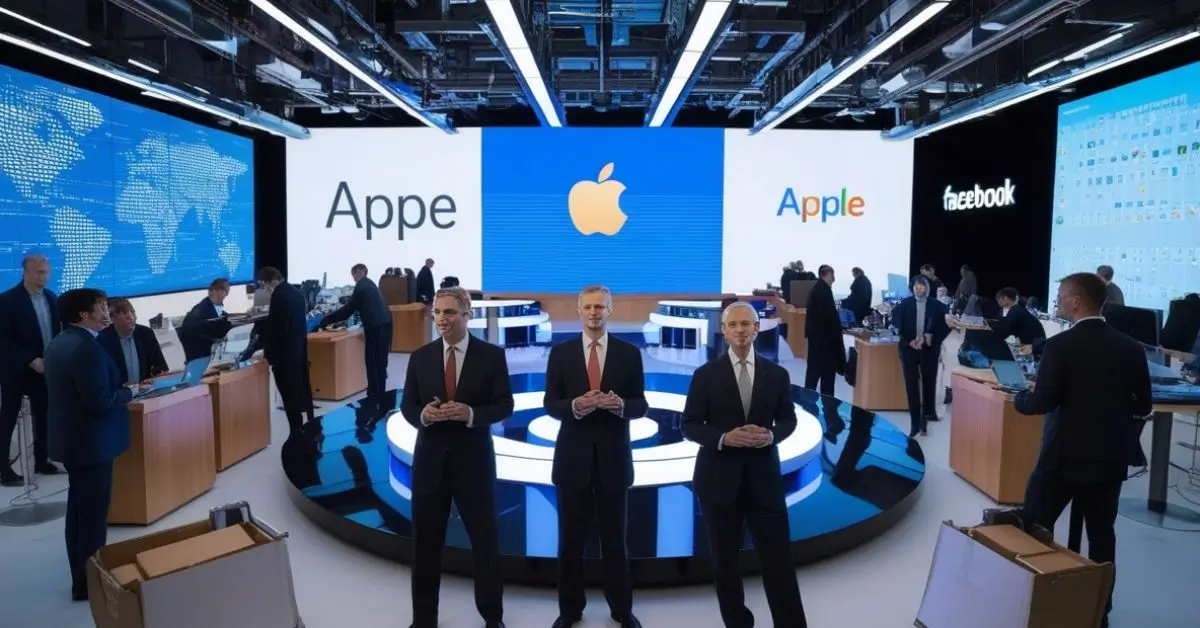In the digital age, technology giants wield enormous influence over global security. Their role extends beyond the creation of software and hardware systems, extending into data control, cybersecurity, AI development, and even shaping governmental regulations. Companies such as Google, Amazon, Apple, Facebook, and Microsoft have evolved into pivotal players in geopolitics, where their innovations and policies can have profound implications for national security, data privacy, and international relations.
The Global Reach of Technology Giants
The scale at which these companies operate is staggering. As of 2024, Google processes over 90% of global internet searches, Amazon dominates e-commerce, and Facebook (Meta) controls vast swaths of social media platforms, all collecting and analyzing massive amounts of personal data. These companies not only dominate their respective markets but also have extensive influence over how information flows globally. This power allows them to shape how data is collected, used, and protected.
The implications for global security are significant. These firms often find themselves at the center of international debates about data sovereignty, surveillance, and privacy. For instance, when it comes to AI, the U.S. and China have distinct approaches to its development and use, with both nations leveraging technology giants to serve their geopolitical interests. The role of AI in security is growing rapidly, from cybersecurity defense systems to military technologies, which increases the need for strict regulations on how these technologies are deployed and who controls them
The New Age of Digital Sovereignty
One of the key issues at play is “digital sovereignty.” Nations are increasingly concerned with the control of their data and technological infrastructure. The European Union, for example, has put forward stringent regulations like the General Data Protection Regulation (GDPR) and the Digital Markets Act (DMA), aiming to limit the monopolistic tendencies of large tech firms and protect citizen data
The U.S., on the other hand, focuses more on innovation and flexibility, although recent moves like the Algorithmic Accountability Act highlight the growing attention on regulating the data practices of these tech giants.
However, these regulatory frameworks often struggle to keep pace with the rapid evolution of technology. For instance, the growing capabilities of AI present a challenge for both regulatory bodies and security agencies. The rise of “deepfake” technologies and the widespread use of AI-driven misinformation campaigns are prime examples of how technology can destabilize societies globally
A New Geopolitical Landscape
Tech companies are not only influencing domestic policies but also the geopolitical balance of power. China’s increasing use of technology to advance its global ambitions is another example of how technology is reshaping international security. With massive investments in AI, 5G networks, and space technology, China is positioning itself to challenge U.S. dominance in global digital infrastructure
The competition between these superpowers has a direct impact on global security, as nations align themselves with either U.S.-led or Chinese-led technological ecosystems, influencing everything from military strategy to economic policies.
The Cybersecurity Challenge
As these technology giants expand their global reach, they create new vulnerabilities in cybersecurity. The proliferation of interconnected devices—thanks to the Internet of Things (IoT)—raises the stakes for security breaches. By 2025, the number of connected devices is expected to exceed 64 billion, further expanding the potential attack surface for cybercriminals and hostile state actors
The responsibility of securing this vast network often falls on the very technology giants that have created it, yet many nations and security experts argue that these companies’ interests may not always align with national security concerns.
The rise of AI and machine learning technologies offers new possibilities for both defending and attacking global security systems. On one hand, these tools can help predict and prevent cyberattacks. On the other hand, they can be weaponized for surveillance, data theft, or even cyber warfare, which could destabilize entire nations or global markets
The Future of Global Security in the Hands of Tech Giants
The control of global security by technology giants is set to deepen. The issue is no longer just about individual companies holding power but about how these firms influence government policies, international relations, and the broader geopolitical landscape. The future will likely see a greater push for international cooperation in regulating these companies, especially as technologies like AI, quantum computing, and blockchain continue to develop.
As we move forward, it is clear that the ability to secure the digital world will hinge on finding a balance between innovation and regulation, where governments and tech companies work together to ensure security without stifling progress.
Comparison Chart: Global Security and Tech Giants
| Aspect | U.S. Tech Giants | Chinese Tech Giants | EU Approach |
|---|---|---|---|
| Control over Data | Dominates global data collection; heavily involved in AI development | Strong state influence; data sovereignty laws | Focuses on regulating data and privacy (GDPR, DMA) |
| Influence on Security | Major players in cybersecurity, AI, and military tech | Growing role in cybersecurity, 5G, and AI for military use | High emphasis on balancing privacy and security |
| Cybersecurity Focus | Advanced cybersecurity solutions, but often criticized for non-compliance with data protection laws | Heavy state surveillance, growing concerns over espionage | Strives for compliance and user protection, but faces challenges with tech giants |
| Global Strategy | Innovation-driven, but facing increasing regulation | Ambitious to challenge Western dominance, esp. in AI and 5G | Regulatory-driven, aiming to limit tech dominance and protect citizens’ data |
Conclusion
The control that technology giants exert over global security is a multifaceted issue that blends innovation, regulation, and geopolitical strategy. As their influence grows, so too does the need for robust governance to ensure that their power is wielded responsibly. It is clear that these companies will play an increasingly significant role in shaping the security landscape of tomorrow, both positively and negatively. Keeping pace with their growth while addressing the risks they pose will be one of the defining challenges of the 21st century.












